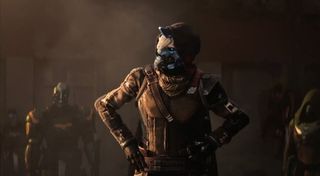Why Destiny 2 Won't Have Dedicated Servers

One of the big questions that comes across the desk (or social media account) of every major developer working on a big online-only multiplayer game is whether or not it will have dedicated servers. Well, before the community ramped up their interest over the topic, Bungie got out in front of the question and explained why Destiny 2 won't have dedicated servers, and it looks like the answer is based in the use of peer-to-peer technology.
Over on the official Bungie website, community manager David "Deej" Dague published comments from engineering lead Matt Segur on Bungie's decision not to use traditional dedicated servers, saying...
We don't use that term, because in the gaming community, "dedicated servers" refers to pure client-server networking models. Destiny 2 uses a hybrid of client-server and peer-to-peer technology, just like Destiny 1. The server is authoritative over how the game progresses, and each player is authoritative over their own movement and abilities. This allows us to give players the feeling of immediacy in all their moving and shooting -- no matter where they live and no matter whom they choose to play with.
Segur goes on to explain that this isn't directly tied to costs since they've spent a lot in investing in new cloud servers for the game. The decision to do things the way they're doing it for Destiny 2 is two-fold: security and stability.
They're using peer-to-peer for instant player actions, but game progression and world data is server-side, so this prevents players from having to deal with player migration disconnections or hiccups during raids or party quests.
It's funny, because Activision has been using peer-to-peer networking for Call of Duty games for years, even while a lot of PC gamers protested and begged for the option to host their own dedicated servers. EA took a different route by renting out Battlefield's dedicated servers to the community as a way to monetize something that was in-demand by the community. No surprise there from EA.
For Destiny, since the game wasn't on PC, the requests for dedicated servers wasn't quite as heavy, so there was an infrastructure built around peer-to-peer client handling, which relies on a player to host a session and stay connected for the duration of that session.
Usually, the PC gaming audience is the one quick to pepper a company and hold them accountable for their reasons in not offering the option for dedicated server support, so, this time around, Bungie stepped out in front of the bus before it picked up momentum.
CINEMABLEND NEWSLETTER
Your Daily Blend of Entertainment News
In the case of Destiny 2, the game will be appearing on PC for the very first time and this brings with it a whole slew of new issues and opportunities for Bungie. Obviously, they weren't going to allow for dedicated server support when it comes to user sessions, because then it opens up a whole new can of worms when it comes to seeding updates, patches and security, and that would obviously disrupt Activision's business plan for the game.
Segur mentions that this doesn't mean that there won't ever be cheaters, exploiters, or lag in Destiny 2, but they're hoping to reduce some of the issues that players encountered when they originally played Destiny.
Staff Writer at CinemaBlend.

Ant-Man 3’s Kathryn Newton Saying Playing Cassie Lang Was The ‘Easiest Job Of My Life’ While Comparing Differences To Abigail

After CBS' Success With The FBIs, Here's What I Want For NCIS: Hawai'i Next Season

A Slow Clap For 90 Day Fiancé: Love In Paradise Introducing The Wildest Couple Problem Yet In Season 4 Premiere
Most Popular







